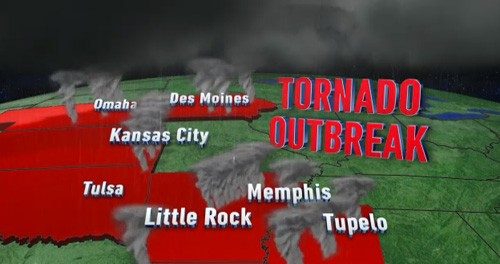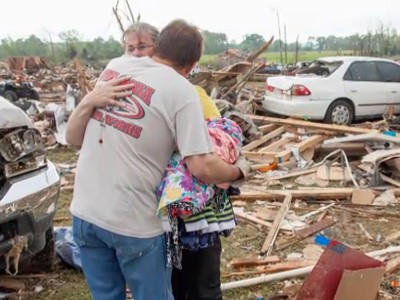It’s hard to believe that after the devastation in 2013, we’re back to another tornado season with the twisters already killing more than a dozen people in Arkansas and nearby states. And with more severe weather happening as I write, and forecast for the coming days, you might want to brush up on your storm response reporting.
Obviously if you’re in the path of current or forecast storms, information for consumers is top of mind and you’ll probably do the usual run-on-retailers stories; don’t forget to check with outdoor-gear stores and other outlets about the demand for weather radios; it sounds as though they could’ve saved lives this weekend when twisters struck in the middle of the night. Weather apps for smartphones are common now too, including those that can wake up sleeping households; you might try something along the lines of this recent CNN roundup of “7 mobile tools to help you survive tornado season.” Generators also are a common storm-survival item. And at the local or small business level, what do construction sites, automobile lots, landscape nurseries and other vulnerable business locations do to avoid or mitigate damage?
Utilities and technology.
Other ways to assess the economic impact of storm prep: Talk to area utilities about their preparations; this is a technology story (graphics about how electricity is routed around trouble spots on the grid, and that sort of thing) as well as a story about the cost of extra crews, overtime and repair materials. Those “on standby” stories about prep leading up to storm strikes can help educate consumers about the scope of utility company operations. Not to mention limitations; here’s an interesting web story on severe weather disruptions by the Association of Electrical Equipment and Medical Imaging Makers (who knew?) — it says counter-intuitively that repairing outages on underground systems can take longer and be more expensive than traditional above-ground systems. (Is that industry bias or objective — I don’t know but an intriguing question for your area’s electric company.) What sort of regional cooperation among utilities takes place when they’re planning for widespread severe weather?
Insurance.
Whether or not your market has experienced damaging weather this year, consumers may be watching the images of flattened subdivisions on TV and wondering where they stand. You can emulate a coping story like this Bankrate.com piece, “Will your home insurance take on a tornado?” and talk with area brokers about caveats. I would even be tempted to take the policies of a handful of random readers to an independent insurance agent or someone from the state regulator’s office to have them parsed –what do they and don’t they cover related to weather, and is there recourse for the homeowner? (Check renters’ policies too.)

Note this Insure.com roundup for consumers, particularly the item about a single storm being categorized as multiple events — meaning consumers will be on the hook for multiple deductibles. Here’s an Insurance Information Institute backgrounder of claims statistics and here’s its page on tornados and thunderstorms. The National Association of Insurance Commissioners reports annually on homeowners insurance premiums; the report isn’t online but you might request data for your state.
Debris removal.
As I’ve written about before, debris removal is a huge cost — and business opportunity — related to tornado and storm damage. Here’s a Monday news report from Business Insider about a one-mile wide “debris signature” from a tornado near Tupelo, Miss. And last year the Huffington Post reported that the wreckage from Moore, Okla. would make a one-mile-high debris pile. All of the scrap needs to be sorted, hauled and directed for disposal or recycling and the contractors or companies taking care of that work would make for some interesting biz stories. Here’s an Associated Press story from last year, for example, noting that Moore was paying its debris contractor three times what another operator was charging in Oklahoma City; it sounds as though out-of-state firms swooped in with low bids. Looks as though debris contractors that are paid with FEMA funds are required to be registered; this might be a way to find out about bids and activity in your area.
Here’s a 10-minute interview on YouTube with the authors of a book called “Economic and Societal Impact of Tornadoes,” and while somewhat conversational it makes some points tornado warnings, the effect of false alarms and even whether the addition of a tornado shelter (or hurricane shutters in different regions) helps residential real estate values. The authors might be good sources for commentary, too.
Here’s the American Meteorological Society’s interactive map tool for finding local chapters, if you’re looking for other tornado experts.










